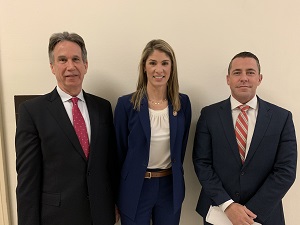Strengthening the Addiction Treatment Workforce and Improving Coverage for Addiction Treatment Emerge as Themes at Congressional Hearing

On March 3, the Subcommittee on Health of the Committee on Energy and Commerce held a legislative hearing entitled, "Combatting an Epidemic: Legislation to Help Patients with Substance Use Disorders." The hearing consisted of two panels, the first composed of Administration officials and the second comprised of external stakeholders, including Dr. Shawn Ryan, the chair of ASAM’s Legislative Advocacy Committee.
The first panel focused largely on the progress the Administration has made towards decreasing opioid overdose deaths and expanding access to treatment. Kimberly Brandt, the Principal Deputy Administrator for Policy & Operations at CMS, drew attention to the relatively new codes created by the 2020 Medicare Physician Fee Schedule to reimburse opioid treatment programs (OTPs) and outpatient treatment of opioid use disorder among other initiatives. She noted that OTPs continue to move through the certification process required to receive reimbursement from Medicare, and she expects the number of certified OTPs to continue climbing in the coming months.
The second panel was comprised of six witnesses including Dr. Shawn Ryan, the chair of ASAM’s Legislative Advocacy Committee. Dr. Ryan's testimony touched on various pieces of critical legislation, including H.R. 1329, the Medicaid Reentry Act, which would allow Medicaid payment for medical services furnished to an incarcerated individual during the 30-day period preceding the individual's release, and H.R. 4141, the Humane Correctional Health Care Act, which would allow states to use federal Medicaid matching funds to cover health care services for individuals who are incarcerated in public institutions. Dr. Ryan noted that upon release, individuals whose OUD treatment has been discontinued are less likely to reenter treatment and furthermore, incarceration without medication treatment increases risk of post-release overdose death through reduced opioid tolerance.
Dr. Ryan also drew attention to three pieces of legislation that would bolster the addiction treatment workforce. The Opioid Workforce Act (H.R.2439), would provide an additional 1,000 Graduate Medical Education (GME) slots to qualifying hospitals with approved programs in addiction medicine, addiction psychiatry, pain medicine, and corresponding prerequisite programs. Additionally, the Medication Access and Training Expansion (MATE) Act (H.R.4974), would require all DEA controlled medication prescribers to have a baseline knowledge of how to prevent, identify, treat, and manage patients with SUD and would allow accredited medical schools and residency programs and schools training future physician assistants and advanced practice registered nurses to fulfill the training requirement through comprehensive curriculum. Furthermore, the Mainstreaming Addiction Treatment (MAT) Act (H.R.2482), legislation that ASAM urged be passed after or concurrent with the passage of the MATE Act, would eliminate what would then be a clearly redundant requirement that practitioners apply for a separate DEA waiver to prescribe buprenorphine for addiction treatment, along with the waiver’s patient limits and extra regulatory burdens. Dr. Ryan concluded his testimony by noting that while progress has been made in strengthening the addiction treatment workforce and improving coverage, there is still significant room for improvement.
Read more about the new reimbursement codes created by the 2020 Medicare Physician Fee Schedule here.
Watch Dr. Shawn Ryan's testimony here.
Read more about Dr. Ryan's testimony here.
Read the complete testimony of each witness here.
